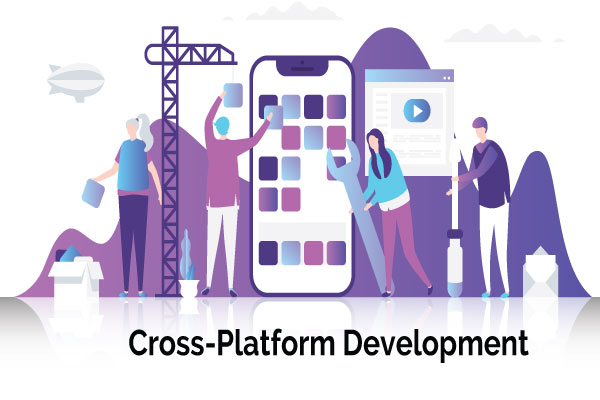Cross-Platform
In the world of app development, cross-platform refers to software that runs on multiple platforms. For example, a mobile app that runs on both iOS and Android is cross-platform. Read on to learn more about cross-platform app development and its uses and advantages.
Why Cross-Platform Development
A mobile app developed for Apple devices cannot run directly on Android devices and vice-versa if it’s not developed from the beginning to be cross-platform or else ported afterward to the other platform. This is because each operating system uses a different code language.
Web apps and websites are similar in that they usually need to be optimized for different browsers—both desktop and mobile—to provide a smooth, error-free user experience.
Cross-platform development is especially important today when many companies opt for a Bring Your Own Device (BYOD) policy, in which employees can access business apps on their personal devices using secure authentication. Different employees may use very different devices.
Cross-Platform Development Explained
Cross-platform development works by writing the app code in a universal programming language like JavaScript that can be exported to other platforms. To simplify this process, developers can use cross-platform app development frameworks like Angular, Flutter, Xamarin, or Ionic.
For simple apps and small projects, developers may choose to do instead hybrid app development, in which an app is rendered via the device’s web browser engine. But this usually results in lower performance than native app development.
Reasons to Choose Cross-Platform Development
Cross-platform development has benefits for developers, their customers, as well as the end-users. Let’s look at some of the key advantages of this approach to app development.
- Faster Development and Deployment – Shorter development times, since two apps are essentially being built at the same time rather than separately. Also, the prototyping process is quicker and smoother allowing for quicker deployment.
- Reduced Development Costs – There is no need to code the apps in two or more programming languages using several frameworks and tools. Developers can go ahead and write the app in one language and then export it to the desired platform.
- Fewer Bugs – Identifying and solving bugs becomes easier since many of them can be addressed directly in the codebase that the different app versions share.
- Unified User Experience – Since it’s being coded by the same team at the same time, the app will be more uniform across different operating systems. This results in a more consistent brand experience.
- Wider Reach for Companies – Cross-platform development enables businesses to reach more users by launching their apps on multiple platforms from the get-go.
What About the Limitations?
The Bottom Line
Although it’s not the solution to all app development projects, cross-platform development has become an important strategy today that offers businesses, users, and developers some important advantages.
It can reduce costs, streamline the development process, and promote uniformity. Because in most cases it ultimately benefits users, cross-platform app development will likely continue to be important for many developers and businesses.
Contact AppsDeveloped.com
Are you interested in finding out more about the benefits of Cross-Platform Development? We’re here to help you out! Please feel free to contact us using our contact form or if you prefer call us directly now at (888) 750-8860.
